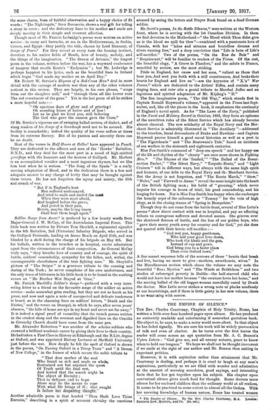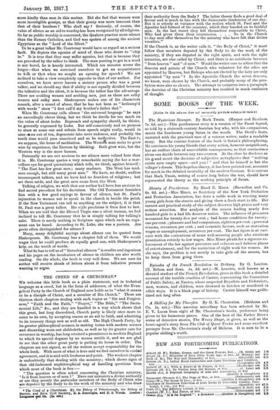THE EMPIRE OF SILENCE.•
Tar Rev. Charles Courtenay, Chaplain of Holy Trinity, Rome, has written a little over four hundred pages upon silence. He has produced an eminently readable and entertaining if somewhat garrulous book. His object is, he says, to make a noisy world more silent. In that object ho has failed signally. We are sure his work will be widely provocative of talk and even of chatter. As he turns over the first leaves the reader will come across an apt quotation from Mr. A. C. Benson's Upton Letters : "God give me, and all uneasy natures, grace to know when to hold our tongues." We hope we shall not be thought irreverent if we smile at the sight of our author and Mr. Benson thus uniting in expectant petition.
However, it is with aspiration rather than attainment that Mr. Courtenay is dealing, and perhaps it is cruel to laugh at any man's aspirations, particularly as we are filled with wonder and admiration at the amount of amusing anecdotes, good sayings, and interesting facts that he has got together upon his subject. His chapter upon conventual silence gives much food for thought. Rome decrees more silence for her enclosed children than the ordinary world at all realizes, It seems to be practised to some extent in almost all the Orders. With her unerring knowledge of human nature, Rome has treated women • The Empire of Silence. By the Rev. Charles Courtenay, M.A. London: SMD8011 Low, Marston, and Co. Os. net.1
more kindly than men in this matter. Did she feel that women were more incorrigible gossips, or that their gossip was more innocent than that of their brothers ? Who shall say ? Seriously, of course, the value of silence as an aid to worship has been recognized by all religions. So far as public worship is concerned, the Quakers practise more silence than the Roman Catholics, and God was spoken of among the ancient Egyptians as the " Lord of the Silent."
To be a great talker Mr. Courtenay would have us regard as a serious fault. He depicts the agonies of mind of thole who desire to "chip in." It is true that they may suffer agonies, but that is because they are provoked by the talker to think The man panting to get in a word is not bored, he is keenly interested. Which ten minutes seems the longer—that when we exercised ourselves to get an acquaintance to talk or that when we sought an opening for speech ? We are inclined to take a view completely opposite to that of our author. For ourselves, we have never known a sinister person who was a great talker, and we should say that if ability is not equally divided between the talkative and the silent, it is because the talker has the advantage. There are scolding women and scolding men, just as there are sulky women and sulky men. Shakespeare makes one of his characters remark, after a round of abuse, that he has not been so " bethump'd with words " since "I first call'd my brother's father dad."
When Mr. Courtenay calls silence "the universal language" he says an exceedingly clever thing, but we think he dwells far too much on the value of silent looks. Reproach and sympathy should, ho thinks, be generally expressed by looks. But self-consciously and on purpose to stare at some one and refrain from speech might easily, would in nine doses out of ten, degenerate into mere rudeness, and probably the tenth time would pass unnoticed and so be ineffective. Tho East we suppose, the home of meditation. The Westeg: man seeks to grow wise by experience, the Eastern by thinking. Both grow wise, but the Western way is the more human.
Personally we are not anxious to see silence more valued here than it is. Mr. Courtenay quotes a very remarkable, saying (ho has a mar- vellous eye for good quotations) which tells, we think, against himself : "The East has few great men ; many madmen. The West has mad- men enough, but still many great men." We have, no doubt, endless inconsequent talkers, and we have had no founders of religions ; but set these aside, and the great men come from the West.
Talking of religion, we wish that our author had been less anxious to find sacred precedent for his doctrines. Tho Old Testament furnishes him with a few good sayings in favour of silence, but St. Paul's injunction to women not to speak in the church is beside the point. If the New Testament can tell us anything on the subject, it is that St. Paul was a great talker. His style proclaims it from first to last. When we are told that the Blessed Virgin was a silent woman, we feel inclined to tell Mr. Courtenay that he is simply talking for talking's sake. There is surely nothing in Scripture upon which such an argu- ment can be based. According to St. Luke, she was a poetess. Are pOets often distinguished for silence ?
Many, many delightful sayings about silence can bo quoted from Shakespeare. Mr. Courtenay has a chapter full of thorn. We would wager that he could produce ma equally good one, with Shakespeare's help, on the worth of words.
• What he has to tell us of " historical silences " is erudite and ingenious and his pages on the inculcation of silence in children are also worth reading. On the whole, the book is very well done. We are sure its author will receive shoals of letters about it from talkative persons wanting to argue.



































 Previous page
Previous page